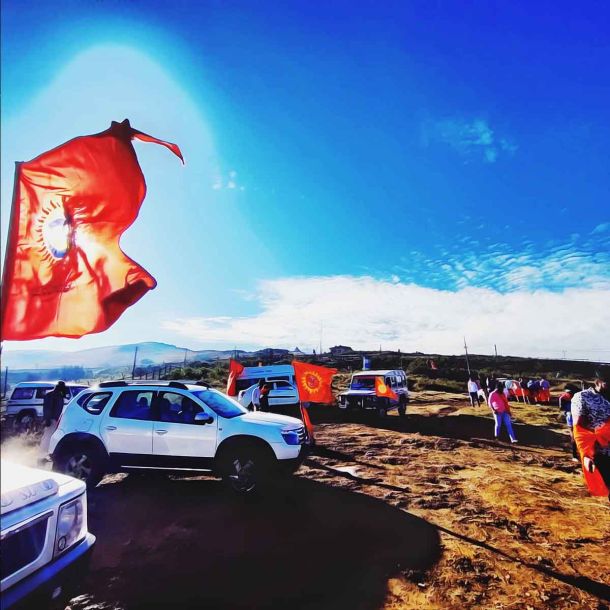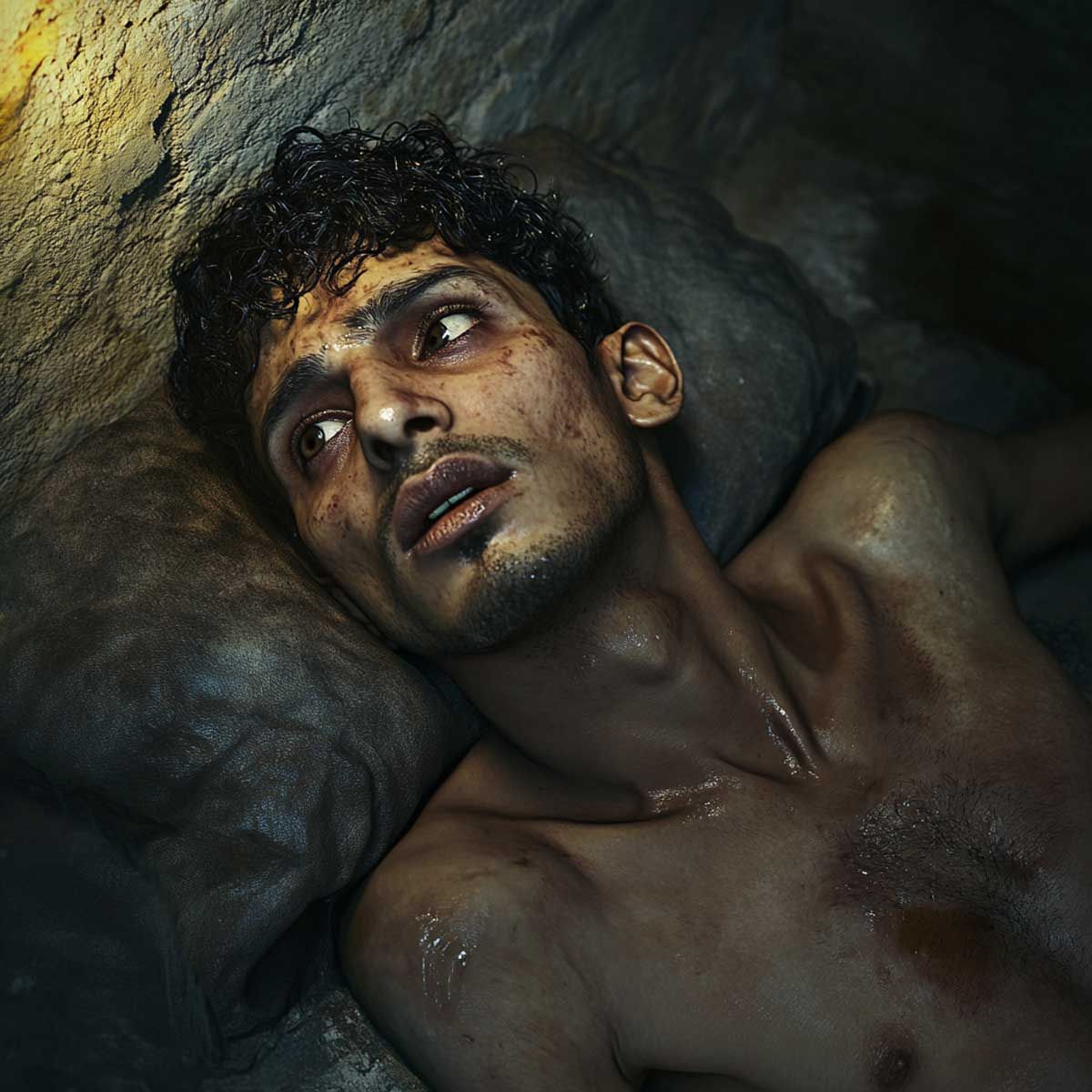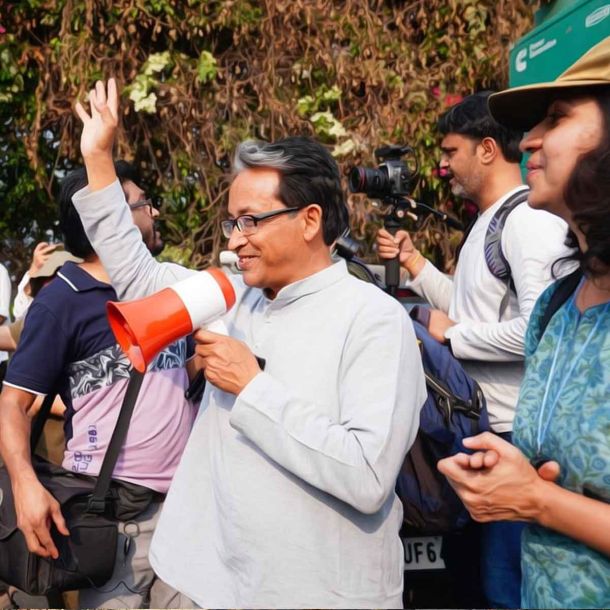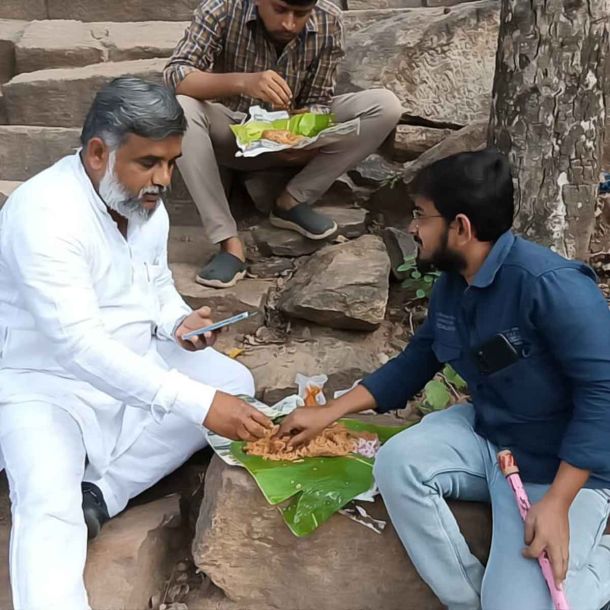More Coverage
Twitter Coverage
Satyaagrah
Written on
Satyaagrah
Written on
Satyaagrah
Written on
Satyaagrah
Written on
Satyaagrah
Written on
Join Satyaagrah Social Media
"हरहरमहादेव": In a momentous occasion, Hindus have reclaimed the right to worship at Gyanvapi's Vyas Cellar in Varanasi after 31 years, symbolizing a significant victory in preserving Hindu's rich spiritual & cultural heritage amidst ongoing legal battles

In a deeply emotional and spiritually significant event, the Varanasi District Court's recent ruling has paved the way for Hindus to once again perform puja within the ancient confines of the Vyas Cellar, located in the heart of the Gyanvapi structure. This decision, bringing to an end a 31-year period of waiting, has been met with profound joy and reverence by the Hindu community. The district administration, acting promptly on the court's orders, unlocked the cellar last night, setting the stage for a momentous day of worship that unfolded with the break of dawn.
|
The court's declaration that "the Hindus have the right to worship the deities in the Vyas Ji Ka Tehkhana (the basement cellar of the Vyas family) at the Gyanvapi complex" marks a historic moment of recognition and respect for the deep-rooted spiritual traditions of the Hindu faith. This cellar, a significant spiritual site within the Gyanvapi complex, has been closely held by the Vyas family for generations, serving as a sacred space for the worship of Goddess Shringar Gauri among other deities. The practice of devotion in this space can be traced back to the 16th century, embodying centuries of uninterrupted faith and devotion until it was abruptly halted in December 1993. The closure of this sacred space, mandated by the government led by Mulayam Singh, represented a significant interruption to the longstanding religious practices of the local Hindu community.
The reopening of the Vyas Cellar for worship is not merely a return to religious practices; it represents a restoration of a cultural and spiritual lineage that has been a cornerstone of the Hindu faith in Varanasi. The administration's swift action to implement the court's order, preparing the cellar for worship, underscores a commitment to upholding the rights and freedoms of religious practice. This act of reopening the cellar, done with the utmost respect and solemnity, signifies a profound moment of reconnection for the Hindu community with their ancestral traditions of worship.
As the first prayers and rituals commenced within the Vyas Cellar, the air was filled with a sense of renewal and spiritual resurgence. The dedication of the Vyas family, along with the broader Hindu community's enduring faith through centuries of change, has been honored through the court's decision.
In a swift and heartfelt response to a landmark legal decision, the Varanasi District Court's mandate was acted upon with urgency by the district administration, transcending the conventional procedural pace. They were tasked with opening the cellar and preparing it for worship within a seven-day window. However, the officials, recognizing the deep emotional and spiritual significance of this event, expedited their efforts and initiated the process immediately.
|
On a quiet Wednesday night, a scene of purposeful activity unfolded at the Gyanvapi structure as administration and police officials arrived. Their first task was to dismantle the physical barriers that had long stood between the worshippers and the sacred space of the Vyas Cellar. With care and precision, they removed the steel grill that had sealed off the southern cellar on the mosque premises. This act alone symbolized the breaking down of barriers, both literal and metaphorical, reconnecting the pathway leading directly from the road in front of the revered Kashi Vishwanath Mandir to the cellar, bridging the past with the present in a profound act of reconciliation and restoration.
Following this significant preparation, the members of the Vyas family, who have historically been the custodians of this sacred tradition, were invited to enter the Vyas Ji Ka Tehkhana. This gesture marked the resumption of a centuries-old practice of devotion that had been abruptly halted. The presence of officials and the police force during this solemn occasion underscored the gravity with which this restoration of religious practice was undertaken, ensuring that the puja rituals were conducted with due respect and in a peaceful manner.
The puja itself was a deeply moving ceremony, replete with the lighting of earthen lamps that cast a gentle glow within the confines of the cellar, symbolizing the light of divine presence rekindled in a space that had long awaited this moment of spiritual renewal. The idols of deities, which had been mentioned in the recently published Archaeological Survey of India report and held in the custody of the district administration, were reverently placed back within the cellar. These sacred figures, integral to the worship practices of the Vyas family and the broader Hindu community, were once again the focal point of devotion. The rituals culminated in the Mangala Aarti, a ceremony of blessings and auspiciousness, concluding in the early hours around 3 AM, marking the end of a historic night of faith and renewal.
|
As the first light of dawn crept over Varanasi, a momentous and heartfelt scene unfolded within the ancient confines of the Vyas Cellar. In an act of deep spiritual significance, women from the Vyas family, embodying generations of faith and devotion, made their way into the sacred space for prayers. Among them, a visual that touched the hearts of many: three female members, including a youthful teenager, engaged in puja rituals. This act was not just a return to spiritual practice but a historic moment that symbolized the culmination of a prolonged struggle for religious rights. After 31 years of waiting, these three women stood as symbols of resilience and faith, marking a victorious moment for the Vyas family and the Hindu community at large. Their dedication and the solemnity of their prayers echoed a triumph over the challenges that had once silenced their sacred rituals, a testament to the enduring spirit of devotion against the backdrop of adversity.
In the wake of this profound ceremony, Varanasi Divisional Commissioner Kaushal Raj Sharma confirmed that the cellar would see the resumption of regular, full-fledged puja activities in accordance with the district court's directives. Starting Thursday, the cellar would once again become a vibrant center of worship, as it had been before the interruption. This decision, rooted in the court's acknowledgment of the historical and continuous nature of worship by the Vyas family, marks a pivotal moment in the reclamation of religious and cultural heritage.
The court's order, articulated by Judge Dr. A.K. Vishvesha, underscored the deep historical roots of the Vyas family's worship practices, dating back to the British period and continuing uninterrupted until December 1993. The abrupt cessation of these practices, as noted by the court, was enacted without any legitimate authority by the state government at the time. In rectifying this, the court's decision to allow Hindus to worship at the Vyas Cellar was not only a legal ruling but a restoration of justice and religious freedom. This order, stemming from a petition by Shailendra Kumar Pathak, sought to reaffirm the right to engage in prayer and perform worship rituals within the Vyas Ji Ka Tehkhana, a sacred space nestled within Varanasi's Gyanvapi complex.
|
The Vyas family, deeply rooted in the history and traditions of Varanasi, took a decisive legal step in 1991. They filed a plea with a clear and profound assertion: apart from the mosque's upper structure, designated for namaz, and its domes, the entirety of the structure rightfully belongs to the Lord Visheshwar temple. This claim underscores a deep-seated belief in the historical sanctity and ownership of the land, reflecting a complex intertwining of faith, history, and law. Despite the Vyas family's physical absence from the Kashi Vishwanath-Gyanvapi complex, their spiritual and legal claim to the Vyas Ji Ka Tehkhana, one of the mosque's four basements, remains steadfast. This claim is not just about property; it's a testament to the enduring legacy of faith and the family's connection to the sacred site.
In a parallel expression of the local sentiment towards the Gyanvapi complex, a notable action by some Varanasi residents further illustrated the communal desire to reclaim and recognize the site's historical and religious significance. In a bold yet symbolic gesture, these individuals altered a public board, overlaying "Mandir" and "Temple" upon "Masjid" and "Mosque." This act of renaming, though simple in execution, carries profound implications, symbolizing a grassroots effort to assert a Hindu identity for the disputed site. It's a manifestation of the community's longing to see the space reflect its ancient origins and religious. significance to the Hindu faith.
|
These developments encapsulate a broader narrative of cultural and religious identity in Varanasi, a city that has long been a crucible of diverse beliefs and historical narratives. The legal plea by the Vyas family and the renaming act by local residents are not isolated incidents but part of a continuum of efforts to navigate the complex layers of history, faith, and identity that define the Gyanvapi complex. They represent a community's quest to reconnect with its past and redefine the spaces that hold deep spiritual meaning, amidst the changing landscapes of modern India.
 |
 Support Us
Support Us
Satyagraha was born from the heart of our land, with an undying aim to unveil the true essence of Bharat. It seeks to illuminate the hidden tales of our valiant freedom fighters and the rich chronicles that haven't yet sung their complete melody in the mainstream.
While platforms like NDTV and 'The Wire' effortlessly garner funds under the banner of safeguarding democracy, we at Satyagraha walk a different path. Our strength and resonance come from you. In this journey to weave a stronger Bharat, every little contribution amplifies our voice. Let's come together, contribute as you can, and champion the true spirit of our nation.
 |  |  |
| ICICI Bank of Satyaagrah | Razorpay Bank of Satyaagrah | PayPal Bank of Satyaagrah - For International Payments |
If all above doesn't work, then try the LINK below:
Please share the article on other platforms
DISCLAIMER: The author is solely responsible for the views expressed in this article. The author carries the responsibility for citing and/or licensing of images utilized within the text. The website also frequently uses non-commercial images for representational purposes only in line with the article. We are not responsible for the authenticity of such images. If some images have a copyright issue, we request the person/entity to contact us at satyaagrahindia@gmail.com and we will take the necessary actions to resolve the issue.
Related Articles
- "ॐ त्र्यम्बकं यजामहे सुगन्धिं पुष्टिवर्धनम्": In a Historic win for Hindus, Allahabad HC upholds right to worship at Gyanvapi, dismisses all Muslim petitions, Court orders swift 6-month decision, ASI can survey any part of plot number 9130 (Gyanvapi site)
- "Big Win for Hindu Side": Historic breakthrough in Gyanvapi case as Varanasi court orders ASI to release survey report, granting both Hindu and Muslim parties access to hard copies, a step towards transparency and justice in the high-stakes legal battle
- "जल वही चढ़ाएंगे": In a big move, Hindus approach Supreme Court for an ASI survey of a Shivling in Gyanvapi Masjid's wuzukhana, challenging its obscurity by artificial walls and questioning its historical reverence in a complex tale of faith & heritage
- In a landmark revelation, ASI's Gyanvapi report claims a temple predating the mosque, with pillars & carvings intact, amidst a storm of cultural debate, pre-Aurangzeb-era relics fuel a historic reckoning for India's heritage, Owaisi and coterie cries fowl
- Teary-eyed Sadhvi Rithambara and Uma Bharti's emotional embrace at Ram Mandir's Pran Pratishtha, Janakpur's 125,000 Diyas celebration, PM Modi honoring the shramiks, and Arun Yogiraj's revered Shri Ram idol creation, culminate in a historic, divine event
- "Truth is often stranger than fiction": Imagine finding a Shivling in every mosque's fountain!" Maulana Tauqeer Raza muses, stoking controversy over the Gyanvapi structure. Is it truth or clever wordplay? History meets sarcasm in this religious saga
- Hindu side filed reply in Supreme Court: 'Gyanvapi property belonged to Lord Adi Vishweshwar since time immemorial, even before the Islamic rule in India, and hence cannot be handed to anybody'
- Shiva temple with Nandi and Linga murtis being used as a godown by a tyre shop, some parts dilapidated in Kanchipuram, TN: JSK Gopi, the rare Hindu voice in the Tamil cinema field uploaded the video
- Sadhguru Jaggi Vasudev's 180° total turnaround from Free Temples campaign last year, says 'doesn’t make any sense to talk about temples razed during invasions as history cannot be rewritten' at Davos World Economic Forum
- "The temple is a place of spiritual awakening”: Basking in the glory of its restoration, the Harihareshwar Temple in Solapur unearthed a unique Bahumukhi Shivling, bearing 359 faces of Shiva with stunning intricacy, each exhibiting a different expression
- PM Modi inaugurates rebuilt Shankaracharya samadhi in Kedarnath and said ‘Adi Shankara brought life to a sleeping civilisation, awakened Bharat to rise above caste boundaries’
- DMK government in Tamil Nadu boasted that temple land worth Rs.2600 crore has been recovered and even launched a book giving details about it, temple lands amount to 5.25 lakh acres: Activist busts HRCE propaganda
- "सत्यमेवेश्वरो लोके सत्यं पद्माश्रिता सदा, सत्यमूलानि सर्वाणि सत्यान्नास्ति परं पदम्": Indian archaeologists found a treasure — ancient and historic caves, temples, Buddhist structures, sculptures, coins and water bodies etc in Bandhavgarh Tiger Reserve
- HRCE flexes muscles to arrest a YouTuber Karthik Gopinath for collecting funds to restore murtis vandalized in an HRCE controlled temple, had moved funds to Padma Shri famed sculptor VK Munusamy to build the broken statues
- 'My deity is visible there. My deity is Viraajman there. Shivling was in their possession in Wazukhana, and they did sacrilege', says Hindu side Lawyer Vishnu Jain: Muslim side drilled a hole in Gyanvapi Shivling to claim it as a ‘fountain’
























